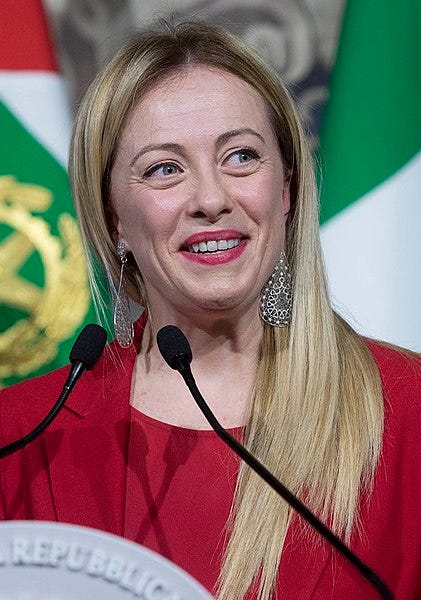🔅 Italy's Africa Summit Is Short On Details & Rwanda's Unique Political Accountability
Plus, Northern White Rhino's Sci-Fi Comeback & West Africa's Ecowas Exit Drama
Photo of the Day

Brief & Bright: Africa's Top Five
Giorgia Meloni's Italy-Africa Summit: All Talk, No Details?
Italian PM Giorgia Meloni, channelling her inner event planner, is hosting a grand summit in Rome. The guest list? A who's who of African leaders. The occasion? Italy's G7 presidency and a development plan for Africa that hopes to put a stop sign on migration flows.
Italy, playing the long game in the migration debate, is pitching a plan to create jobs in Africa. Their aim is to make home so appealing that crossing the Mediterranean to Italy in search of greener pastures seems less appealing.
Meloni, with her hard-right stance, says that her outlook will be non-predatory and non-paternalistic. So far, however, it has been very light on details. Will the summit end up being nothing more than an expensive photo-op?
What Rwanda's Annual Public Assessment of Government Performance Says About President Kagame
In Rwanda, President Paul Kagame's Umushyikirano, translated as the National Dialogue Council, is an annual spectacle of political accountability, unique in its format and execution. Held in the Kigali Convention Center, this televised event draws the nation’s attention as Kagame conducts a public audit of his ministers and bureaucrats based on grievances collected via social media and local meetings.
This forum underscores Mr. Kagame's governance style, characterized by an unflinching pursuit of efficiency. Umushyikirano serves as a reminder of Kagame's firm grip on power, and Bloomberg breaks down the event and the all-important figure heading the annual meeting.
Kenya's Hot Spot for Power: Geothermal Energy and Wildlife in the Great Rift Valley

Imagine a valley where flamingos frolic and wildebeest wander, right in the heart of Kenya's segment of the Great Rift Valley. Now, forget the wildlife for a second and dig deeper—literally. Beneath this picturesque postcard lies a geothermal goldmine, turning Kenya into a clean energy superstar. The Great Rift Valley, a geological marvel stretching from Jordan to Mozambique, came into being when the Somalian and Nubian tectonic plates threw a tantrum and split apart 25 million years ago. This tiff brought scalding hot magmatic fluids close to the surface, ideal for geothermal energy. We're talking about water and steam heated to a sizzling 300C under pressure of 1,000 PSI. Kenya's basically sitting on a giant, underground pressure cooker that is a geothermal jackpot.
But it wasn't always so steamy and successful. Kenya's geothermal journey had more false starts than a poorly organized marathon. The first attempts in 1956 were a flop, but the 1970s oil crisis got the steam rolling.
Today, Olkaria, near the floral town of Naivasha, is buzzing with nearly 300 geothermal wells. These wells feed into five power plants, generating 799MW of clean, green power. Kenya is now proudly sitting in sixth place globally for geothermal energy, contributing to an impressive 91% of its energy from renewables, making it a poster child for eco-friendly power.
Northern White Rhino: The Comeback Story?
In a twist fit for a sci-fi novel, the nearly extinct northern white rhinos might just get a shot at survival, thanks to some groundbreaking science. After the last male of their kind, Sudan, took his final bow in 2018, leaving only two infertile females, Fatu and Najin, the species' fate seemed sealed. But hold on...
Enter BioRescue, a group of international researchers with a bold plan: their plan is to implant the first northern white rhino embryo into a southern white surrogate. It's a delicate process, and success is far from guaranteed. But if it works, we could see the first northern white rhino calf since the turn of the millennium. This isn't just about one calf; the researchers have got 30 embryos on ice, and if all goes well, they're hoping for a mini baby boom.
West African Exit: Niger, Mali, Burkina Faso Say 'Au Revoir' to Ecowas
Niger, Mali, and Burkina Faso have decided to exit the Economic Community of West African States (Ecowas). These countries, all led by juntas, were already on a timeout (read: suspended) from Ecowas for not playing nice with democracy. Declaring it a “sovereign decision,” they've decided to unfriend the bloc, which they have been a part of since 1975. In a joint statement, they accused Ecowas of losing its Pan-Africanist ideals and playing puppet to foreign powers, and of not providing enough support against jihadist violence brewing in their region.
Mali, Niger, and Burkina Faso are landlocked countries that depend on ports in their ECOWAS neighbours for imports and exports. Leaving the bloc could, therefore, see an increase in tariffs and could impact the free movement of their citizens and financial flows within the rest of the bloc.
Food for Thought
“He who's destined for power does not have to fight for it."
— Ugandan Proverb







